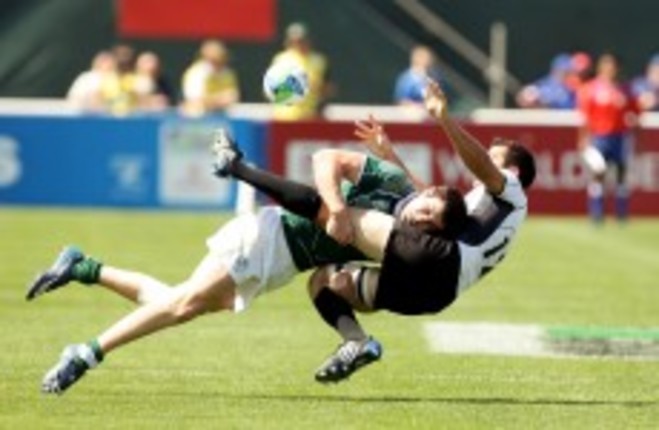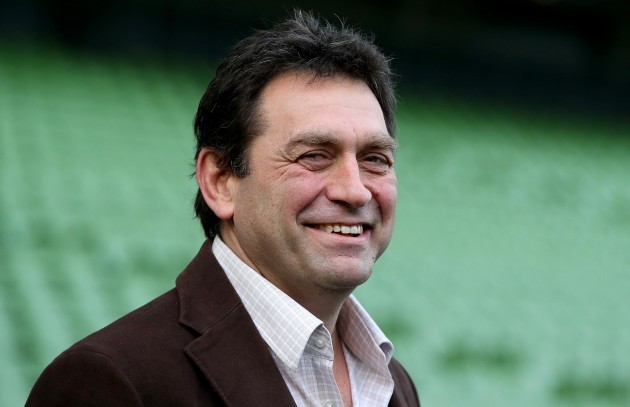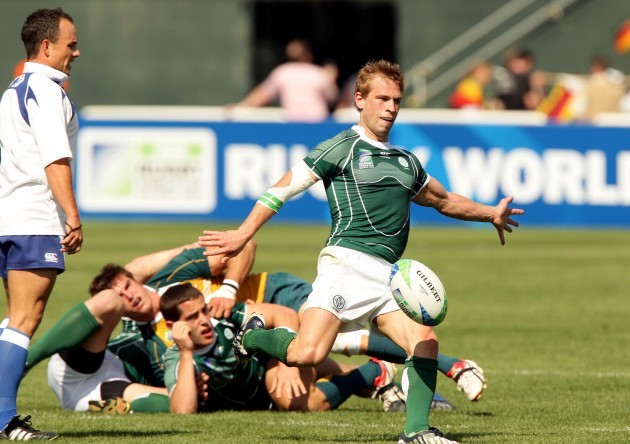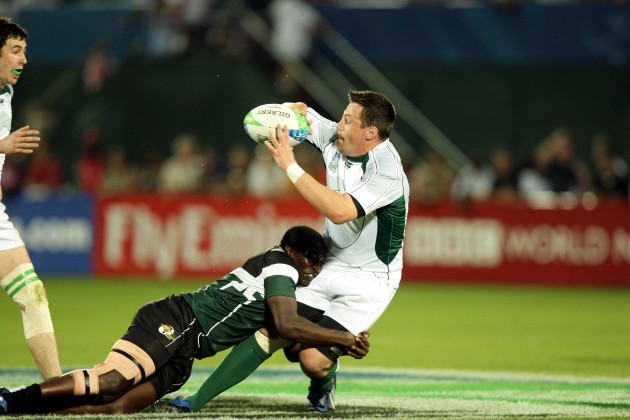IT MAY SOUND more akin to something from American football, but Irish male athletes will have the chance to get involved in the IRFU’s new rugby sevens programme through a series of Talent Identification Days [TIDs] next month.
Essentially, Irish rugby’s governing body are aiming to find the best athletes in the country to play sevens, whether their backgrounds are in GAA, athletics, basketball, hockey or rugby itself.
The oportunity was announced earlier this month, and the IRFU have received almost 400 applications already, the vast majority from athletes who have played rugby before, but also including a range of athletes who have no experience in the oval ball game.
“The response has been terrific,” says the IRFU’s Performance Director, David Nucifora, the key figure in the organisation’s decision to relaunch their male sevens programme after five years of inactivity.
It’s a really positive sign and a good indication that the players are keen about the game of sevens in this country. The fact that there are guys outside of the professional game, and the academies, who want to have a crack at this game is really encouraging.”
Indeed, the IRFU are hopeful that the number of applicants will shift well above the 400 mark before their deadline next Friday, 19 December. Thereafter, dates and locations for the TIDs will be finalised.
Nucifora outlines that the athletes will be tested for their “power, speed and endurance” at the TIDS, with no strength testing. Yoyo tests, vertical jumps, as well as speed tests over 10, 20 and 40 metres will make up part of the battery of assessments.
“We’ll benchmark those results against what we know are the key characteristics of a good sevens’ athlete,” says Nucifora.
“Obviously we’ll keep an eye on their other sporting background, where their rugby prowess might be, but if they don’t have a rugby prowess we’ll judge them purely on their physical attributes.”
The best performers at the TIDs will advance to secondary testing at a later stage, an “actual sevens trials day where we’ll play games.” Nucifora estimates that 30 to 50 of those present at the TIDs will progress to those try-outs, although that figure may change depending on the quality of athletes present.
After the sevens trials day, Nucifora and his team will select the very cream of the crop to form the Ireland sevens group alongside “the best of the identified boys” from the Munster, Leinster, Connacht and Ulster academies and sub-academies.
It’s a unique opportunity for any sportsman willing to take a punt on themselves, and the fact that not only rugby players are being invited to apply adds an element of intrigue.
How realistic is it that a Gaelic footballer, for example, with no rugby experience could actually progress through a TID and the subsequent sevens-based trials? Nucifora points out that sevens is certainly more accessible than its 15-a-side cousin.
“It’s a lot easier [to get into] than 15s. Sevens is a simplistic form of the game in a lot of ways. The beauty of 15s rugby is its complexity for a lot of people, whereas the beauty of sevens rugby is its simplicity.
“That’s why it has the ability to attract a totally different crowd, as well as player. Obviously if they haven’t played the game at all, we’ll be taking that into account, but if they’re an exceptional athelete and we think they’re worth the effort to convert, then we’re confident that we’ve got the people that can do that.”
Whatever about the crossover athletes, the IRFU’s re-entry into men’s sevens – which will begin by competing in Division C of the Men’s Rugby Europe Championship next June – means opportunities for the talented club rugby players in Ireland.
There is quality all over the country in that regard, countless examples of players who have slipped out of the province’s academy systems or perhaps never even been close to that level.
For those individuals, this is an ideal chance.
“It has all those possiblities,” says Nucifora. “It can be a bit of a safety net for guys that drop out of the professional game, maybe guys who have not made a fist of their first go into the professional game in 15s.
Rather than drop out of the game altogether, we believe it’s a chance for the sorts of guys who have been judged not to have cut the mustard, so to speak, to maybe get into sevens and reinvent themselves.
“It serves a lot of different purposes and not only the straight skill development, but just the exposure that it can give to players, especially if we can move into the higher echelons of sevens.”
Nucifora points to the Ireland Women’s sevens team playing in front of 40,000 people in Dubai last weekend as an example of that exposure, underlining his belief in the game of sevens as a vital componet of the IRFU’s long-term strategy.
In line with that, yesterday’s appointment of Anthony Eddy as Director of Sevens and Women’s rugby is a vital move.
The Australian was General Manager of Rugby Sevens in his homeland, overseeing the management and coaching of the seven-player code across the country. He brings a crucial element to the party as Ireland relaunch their own sevens programme.
“Experience, that’s the key thing,” says Nucifora. “He’s a guy who’s done a lot of the onfield coaching in Australia, a guy that’s put together and built the sevens programme in Australia for both women and men.
“So he’s got great experience in both those areas of being hands on in a coaching aspect, as well as being hands on in being able to be the person to indentify the talent for the game over there.
I think it’s critical for us and part of his remit will be to also educate Irish coaches. So we’ll be bringing a lot of other Irish coaches under his wing to advance the game of sevens in Ireland.”
Meanwhile, Marian Earls will come on board as full-time Head of Strength and Conditioning for the sevens programme and women’s rugby.
Nucifora has been the key driver in all this change, as the IRFU now looks to catch up with the world’s other leading rugby nations, all of whom have been part of the sevens code for some time.
The IRFU Performance Director again points to the value of sevens as a development tool for 15-a-side rugby, but also stresses “the speed at which sevens is growing and the excitement that is going along with that growth.”
It will be fascinating to witness the range of athletes who are involved in next month’s TIDs, as Irish men’s rugby takes its first step back into sevens.
The closing date for applications is 19 December and anyone interested can sign up here.




